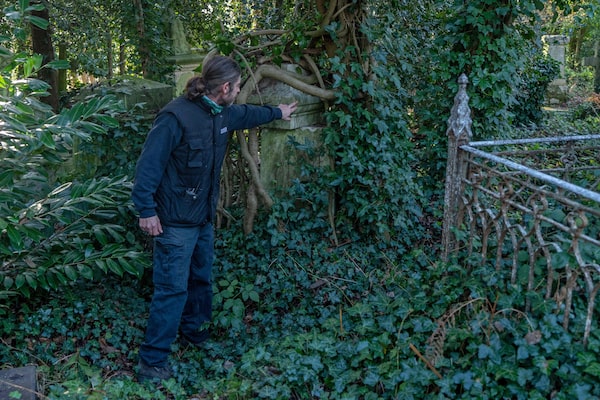Good afternoon, and welcome to Globe Climate, a newsletter about climate change, environment and resources in Canada.
Lately Ottawa has been speaking more of a green recovery.
“The Liberals have a whole lot of follow-up work to do, if Mr. Trudeau wants a green recovery as his legacy,” wrote Adam Radwanski this week. “And they can’t really wait until the pandemic is firmly in the rear-view mirror before getting down to the longer-term plans they’re still mostly hinting at.”
Unfortunately, Ottawa’s recent fiscal update disappointed on this front, Adam argues, with a not-so-new energy retrofit program.
Now, let’s catch you up on other news.
Noteworthy reporting this week:
- Chasing the hydrogen dream: Ballard on quest to transform long-haul transportation
- From Report on Business Magazine: How companies can avoid and recover from allegations of greenwashing (Bonus: check out this other ROB magazine story about a Regina-based CEO’s focus on plant-based proteins has opened Canada up to a $10.8-billion market)
- ‘It’s not enough to get to net zero’: Activists find commonalities in climate, racism reform
A deeper dive
WHERE PARIS FAILS, FINANCE FLOWS
Ryan MacDonald is a senior editor at The Globe heading the climate, environment and resources team.
The Paris Agreement is not aging well.
On Dec. 12, 2015 in Paris, 195 countries agreed to a global accord committed to keeping the rise in global temperatures below two degrees, a level beyond which scientists think there could be catastrophic consequences. Countries set a 1.5-degree rise as an aspirational goal. Canada pledged to, by 2030, cut its emissions by 30 per cent from 2005 levels.
So how has the world fared in five years? Not too well.
Nearly every G20 country that signed the agreement is missing its emissions goals. Canada, for its part, has never come close to meeting its goals. (All parties to the Paris Agreement need to communicate their Nationally Determined Commitments or NDCs every five years).
Still, not all is lost.
In the absence of significant progress on the Paris goals, what has emerged among G20 nations is a commitment to reach “net-zero” emissions, with Germany, France, Canada, China, South Korea and Japan among the nations to vow to get to net zero by 2050. This, in turn, has led to an onslaught of commitments from provinces, cities as well as private and public companies.
And what is sometimes forgotten in the Paris Agreement is its long-term goals to making “finance flows consistent with a pathway toward low-GHG emissions and climate resilient development.”
While government progress on emissions may be disappointing, there is evidence to suggest that on the finance side, things are changing – and quickly – as big investors and private companies embrace the principles of sustainable finance, put money into renewable energy and make investments in clean technology.
There were those who viewed the Paris Agreement as a signal that the world is on an irreversible path to a low-carbon economy and that it would shape investments for decades. Only five years on, we are starting to see those investments take shape - and that is progress.
Worth watching: The Globe is media sponsor for Corporate Knights’ Fireside Stories for Climate event Dec. 9, featuring Margaret Atwood, David Suzuki, Sheila Watt-Cloutier and Michael Sabia. Adam Radwanski will lead a discussion of how we go from knowledge to action. You can register here
What else you missed
- A lot of investors are very excited about the prospects for hydrogen fuel cells again, which has pushed the share price of Canada’s Ballard Power Systems up more than six-fold since early 2019, from less than $4 to $25 recently.
- Scientists say a year in which almost 200 tundra lakes drained away could point to what’s in store for Canada’s North.
- As an extreme year for hurricanes, wildfires and heat waves comes to an end, the head of the United Nations challenged world leaders to make 2021 the year that humanity ends its “war on nature” and commits to a future free of planet-warming carbon pollution.
- A long-running study of more than 50 dead killer whales in the Pacific Ocean concludes human activities pose deadly threats to the orcas.
- Climate change costs are already taking an increasing bite out of Canada’s economic growth and the country is falling behind other nations when it comes to planning for them, says federally funded research.
- Glencore boss Ivan Glasenberg’s departure will mark a shift to a new, younger leadership for the business, which, along with other mining companies, has faced increasing pressure from investors to cut carbon emissions.
Opinion and analysis
A year ago, Canada’s oil exports had a bright future. The future just got a lot more challenging
The editorial board: “The CER outlook is speculative, but the direction is clear. Canadian industry and governments have to reckon with a new future.”
Alberta’s oil-pipeline pipeline might be nearing its end
Andrew Leach: “The alternative – accepting a new Alberta economy without the engine of oil-sands growth – is not easy to accept, either. But that’s been staring us in the face for years.”
For today’s corporate directors, 2050 climate targets are generations away. Here’s what they need to do now
Michelle de Cordova and Sarah Keyes: “While comprehensive climate strategies will take time to develop, current directors need to act now to ensure that Canadian companies are positioned to thrive in the global transition to a net-zero economy. Every journey starts with a single step.”
Green, equitable and job-creating: Why Ottawa should make a big investment in public transit
The editorial board: “For millions of Canadians, including millions of low-wage essential workers, from food services to health care, public transit is the most essential of public services.”
Here’s what readers had to say
Last week, climate columnist Adam Radwanski asked: Are the Liberals ready for the pushback against one of their most pivotal climate policies? Readers responded, here’s some of what they had to say:
- Sense2cents: I’m a middle income person who is willing to pay whatever carbon tax is needed to help save our planet. It’s at the point where we must do whatever it takes. Postponing action will make achieving our goals more unlikely and expensive as we continue to emit carbon and greenhouse gases into our severely compromised atmosphere.
- BobPita: A carbon tax is not a punishment - but an inducement - or impetus to turn the tide.
- Snowaway: How much bio-diversity is lost via these biofuel schemes?
Making waves
Each week The Globe will profile a young person making a difference in Canada. This week we’re highlighting the work of Willa Fisher who works to balance activism and mental wellness.

Willa FisherHandout
My Name is Willa Fisher, I am 18 years old living in Halifax and Bridgewater and a student at NSCAD. I am a co-founder of School Strike for Climate Halifax. While it may seem like our main focus is to protest government action, a lot of our work actually focuses on dealing with the mental effects of the climate crisis.
It is important that we also focus on taking care of each other and ourselves in these difficult times. By doing something relentlessly, like participating in protesting, we slowly create change and that is the only thing that can truly relieve climate anxiety.
Climate change is a very intersectional problem. I believe that to fight for Climate Justice, we need to ensure that the general population is behind the decisions once they are made. We have to move together and leave no one behind. It doesn’t come from your diet. It comes from your involvement in the grassroots community, from your voice which you can use to educate others. Your power comes from your hope, from the fact that you are still willing to try. Use this power in whatever way you are capable because there is no action that has truly no effect in this world.
- Willa
Do you know an engaged young person? Someone who represents the real engines pursuing change in the country? Email us at GlobeClimate@globeandmail.com to tell us about them.
Photo of the week

Head gardener Frank Cano points out damage to a gravestone caused by tree roots in Highgate Cemetery on December 1, 2020 in north London. Global warming is threatening London's historic Highgate Cemetery, an overgrown oasis housing graves of notable figures from Karl Marx to pop singer George Michael, its custodians say. Concerned at rampant fungi, freak storms and shifting graves, the cemetery's custodians are seeking expert help to ensure its survival.NIKLAS HALLE'N/AFP/Getty Images
Guides and Explainers
- We’ve rounded up our reporters’ content to help you learn about sustainable ways to live life at home, travel, invest, and generally to learn about our species at risk.
- If you like to read, here are books to help the environmentalist in you grow, as well as a downloadable e-book of Micro skills - Little Steps to Big Change.
Catch up on Globe Climate
- Climate change merits a fiscal response, too
- Ottawa creates legally binding climate targets. Sort of.
- The future of our cities also needs to be green
- Joe Biden will change the calculus of Canadian climate policy
We want to hear from you. Email us: GlobeClimate@globeandmail.com. Do you know someone who needs this newsletter? Send them to our Newsletters page.
 Sierra Bein
Sierra Bein